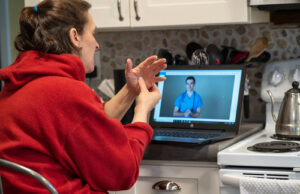
U.S. Sens. Roger Wicker (R-MS) and John Hoeven (R-ND) on June 15 proposed a bicameral, bipartisan bill that would expand access to telehealth services, ensure program integrity, and provide beneficiary and provider supports, quality of care, and data.
“Telehealth is a revolutionary development in health care delivery,” Sen. Wicker said. “The internet put communications and commerce in the palm of our hand, and it is now doing the same for health care.”
As the lead original cosponsor, Sen. Wicker led 58 of his fellow colleagues, including Sen. Hoeven, to offer the Creating Opportunities Now for Necessary and Effective Care Technologies (CONNECT) for Health Act of 2023, S. 2016, which is sponsored by U.S. Sen. Brian Schatz (D-HI).
“After years of dedicated efforts, I am pleased to see the growing support for making flexibility in telehealth delivery permanent,” said Sen. Wicker. “The CONNECT for Health Act will move us toward Medicare beneficiaries receiving the health care they deserve.”
“Telehealth is an increasingly important tool that empowers Americans across the country, particularly in rural states like North Dakota, to access their health care providers with greater convenience and at a lower cost,” added Sen. Hoeven. “That’s why we’re working to remove restrictions on this critical technology and provide the flexibility that patients and providers need to better utilize its potential for improving health and well-being.”
If enacted, S. 2016 would expand coverage of telehealth services through Medicare, make permanent COVID-19 telehealth flexibilities, and make it easier for patients to connect with their doctors, according to a bill summary provided by the senators.
The legislation would permanently remove all geographic restrictions on telehealth services and expand originating sites to include the home and other sites, and permanently allow health centers and rural health clinics to provide telehealth services, according to the text of the bill.
S. 2016 also would allow more eligible healthcare professionals to utilize telehealth services; remove unnecessary in-person visit requirements for telemental health services; and allow for the waiver of telehealth restrictions during public health emergencies, the text says.
Additionally, the bill would require more published data to learn more about how telehealth is being used, impacts of quality of care, and how it can be improved to support patients and health care providers, according to the bill’s language.
Sen. Schatz noted that while telehealth use has skyrocketed during the last few years, federal laws have not kept up. “Our comprehensive bill makes it easier for more people to see their doctors no matter where they live,” he said.
U.S. Reps. Bill Johnson (R-OH) and Mike Thompson (D-CA) on June 15 introduced the same-named companion bill, H.R. 4189, in the U.S. House. The measure has garnered support from more than 150 organizations.



